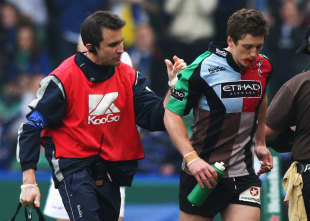|
English Rugby
'Bloodgate' doctor fears for future
Scrum.com
August 27, 2010

Tom Williams faked a blood injury during last year's Heineken Cup defeat by Leinster
© Getty Images
Enlarge
The doctor at the centre of the 'Bloodgate' scandal said she would "deeply like" to return to medicine, but conceded it would be difficult to find work. Dr Wendy Chapman said her name would forever be associated with her part in the scandal in which she cut the lip of a player to cover up his bogus injury. Tom Williams' supposed injury meant a specialist kicker could come on to the pitch for Harlequins in the dying minutes of last April's Heineken Cup quarter-final tie against Leinster, who held on to win 6-5. Appearing before the General Medical Council, Chapman said that before 'Bloodgate' she had been hoping to take a fuller role at the club and was in line to work in some capacity at the London 2012 Olympic Games. She told a fitness to practise panel that although she had received support since from "various people" at Harlequins it had been "made plain to her" that she would never work for them again. Chapman previously said she was "ashamed" that she gave into pressure from Williams, who wanted to conceal that, minutes earlier, he had bitten into a fake-blood capsule. She admitted almost all the charges levelled against her by the GMC, which said her conduct on the matchday, and at a later European Rugby Cup (ERC) disciplinary hearing, was likely to bring the profession into disrepute and was dishonest. The panel sitting in Manchester found all the facts against her proven apart from an allegation that she stated Williams had a loose tooth in order to deceive others that he had sustained an injury on the field of play. The former accident and emergency consultant at Maidstone Hospital today gave further evidence as the panel began to consider whether her fitness to practise was impaired because of her misconduct. Her counsel, Mary O'Rourke, asked about her future prospects of employment. "Obviously it is hugely dependent on what the panel decide. It is also going to be hard to get work after this," she said. "I do not imagine ever working in sports medicine again, basically the prospects are minimal. Whenever my name comes up there will always be Bloodgate tied to it and now a GMC investigation as well. Before Bloodgate I was looking at taking a fuller role at Harlequins Rugby Club. "I had been assured by others that I was in a good position to work on London 2012." She said she could not envisage working in A&E again and a return to Harlequins had been ruled out. There has been some support from various people at Harlequins but it has been made plain to me there will be no place for me. I don't think it will go away but I just want to show, if I'm allowed, that I can hold my head up and prove this was not the person I am." Chapman said a career in medicine was "desperately important to me" and added: "I would deeply like to go back to being a doctor. (I am) 100% confident nothing like this would ever happen again". Earlier, panel chairman Dr Brian Alderman ruled there was no evidence to say the intentional act of cutting was "pre-meditated or you had any involvement or prior knowledge of the deception". He said: "The panel consider that, while Tom Williams was a professional player and part of the team and you were a team doctor, he was in fact your patient at the time of the incident. "As a doctor, your overriding care of duty was to the patient irrespective of the pressure you were feeling at the time. While your actions may have been intended to benefit or preserve Tom William's career they were not in the best interest of his health. You were there to treat his alleged injury, not to cause one." The initial ERC disciplinary hearing last July cleared Chapman of conspiring to get Evans back on the pitch. After she was acquitted as a defendant she then effectively gave evidence as a prosecution witness where she backed up the club's initial version of events that the injury was real. Richards was given a three-year ban by the ERC appeals panel after Williams later changed his evidence and told the truth. It emerged during the hearing that Richards ordered fake blood injuries on four other occasions and orchestrated the "Bloodgate" cover-up. Williams' initial 12-month ban was reduced to four months after his admission of the capsule use, club physiotherapist Steph Brennan - said to have given the capsule to the player - was banned for two years, and the club was fined £258,000. Chapman is currently suspended from practising medicine pending the outcome of the hearing in which she could be struck off. © Scrum.com
|
Live Sports
Communication error please reload the page.
-
Football
-
Cricket
-
Rugby
-
- Days
- Hrs
- Mins
- Secs
F1 - Abu Dhabi GP
Abu Dhabi Grand Prix December 11-131. Max Verstappen ()
2. Valtteri Bottas (Mercedes)
3. Lewis Hamilton (Mercedes)
4. Alexander Albon ()
5. Lando Norris ()
6. Carlos Sainz Jr ()
-
ESPNOtherLive >>
Golf - Houston Open
Snooker - China Open
Tennis - Miami Open

